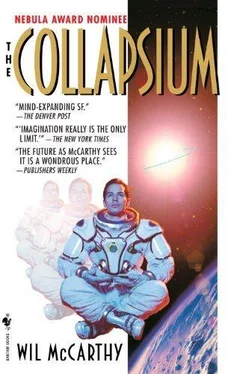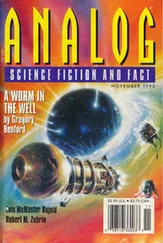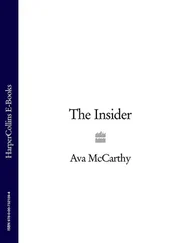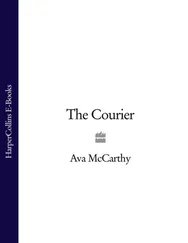But the stars didn’t interest Bruno just now; he was inspecting, for perhaps the hundredth time that month, the ring of collapsium—of quantum-repulsion black-hole matter—with which he’d encircled his dark little sun. Once upon a time, that matter had comprised an ultradense “moon” of di-clad neutronium. Later, it had been an Onion of vacuum-rending collapsium shells, and afterward a disc and a cube and a series of interlocking equilateral triangles. From each configuration he’d learned a thing or two—mainly about how ignorant he really was, and how mysterious the inner workings of God’s universe could be at their most fundamental levels.
Perhaps someday those collapsons would form an arc de fin —an archway through which the end of time could be observed, for purposes that Bruno had never really been able to articulate. Because it was there, he supposed. Because he felt like knowing. He’d managed, over the years, to confirm the theoretical possibility of such a device, and to derive some vague, half-baked notions as to how it might be constructed. But it was a long way from there to actually building the thing. It would be the work of centuries, he feared, perhaps even millennia.
Pinching his bearded chin thoughtfully, he studied the “ring,” which was actually a quite complicated arrangement of scallopy, sinusoidal ripples, one upon the other, like a lace apron or tutu strung across the sky. It glowed the bright, pale color first glimpsed by Pavel Cerenkov in the twentieth century; the blue of supraluminal particles shedding energy as they dropped below the speed of light.
Had he surrounded the planet with it, the ring might have appeared as a peaked arch linking one side of the horizon with the other. Well, perhaps not—Bruno’s planet was so small that it sloped away like a hilltop beneath his lounge. As a result, his horizons were not only close, they were visibly down . At any rate, there wasn’t nearly enough collapsium to encircle the entire planet. He’d need three or four kilometers of it to accomplish that. But the “sun” was much smaller, and the collapsium looked like exactly what it was: a frilled ring a few centimeters thick and fifty meters around, encircling a dark, spherical body orbiting some seven hundred meters above the planet’s surface.
The inside of a warehouse would be as inspiring.
Or perhaps that was merely the contempt of familiarity speaking, or Bruno’s own long frustration; perhaps the scene was more wonderful and wondrous than anything Isaac Newton—in his plague-ridden, wattle-thatched world—could possibly have imagined. Bruno feared, suddenly, that this was so. He sat up, looking around him at the steamy, starlit darkness, wondering if, through years of neglect and overwork, he’d burned out his capacity for wonder. What a thought! What if he made the arc de fin, glimpsed the fading lights of the end of time, and could muster no more than a weary “eh”? How awful!
He made an effort to see the scene with fresh eyes: the planet like a little benighted Eden, the stooping robot field-workers like peasants of a land so wealthy its very citizens were made of gold. And over there, his little cottage with its wellstone walls all turned to white glass, a pretty trick indeed. And above it all, the collapsium, glowing blue as the ghosts of drowned sailors. Soon enough, that scalloped ring would be gone, replaced by some new assembly, some new experiment. It was a fleeting thing, a blossom.
There was the problem, though—the very reason for Bruno’s frustration. He’d long ago run out of fresh neutronium and had for years now resigned himself to recycling his collapsium over and over again. Every experiment had to be dismantled to make way for the next—carefully, to prevent its structure from collapsing into a single, ordinary hypermass. Such dismantling required phenomenal precision, and thanks to inertia it also required such vast amounts of energy that he’d been forced to harness virtually the entire output of his miniature star.
The star—his own invention—was simple enough; a neutronium core wrapped securely in superreflectors, holding down an outer sheath of hydrogen in self-sustaining nuclear fusion. But it was for light , damn it; it was meant not only to warm but to brighten this little world at the fringes of interstellar space. So thanks to inertia, he lived in the dark, and while he could certainly build a new sun, and even a new moon to go with it, the difficulties of contacting the Queendom to arrange for neutronium production and delivery would consume his attention as surely his experiments consumed light, possibly for years. Bah.
He could, of course, hop into the fax machine and duplicate himself, but he knew himself too well; the duplicate wouldn’t want to deal with logistical headaches any more than he did. Within hours it would be commandeering his precious resources for some new harebrained experiment, and his attempts to argue the point would prove worse than fruitless, for the duplicate would believe itself to be him . And it would be right. He’d played this drama out enough times to know the pointlessness of it.
And yet…
Was it any better to live in darkness? To cast aside the final pretense of comfort and live as a perfect troglodyte scientist, with no human needs left to neglect? How Tamra Lutui—the Virgin Queen of All Things—would recoil at that! As he himself should recoil, hearing it reduced to those terms.
He sighed, musing darkly: if only inertia could be overcome; if only he could really proceed , unhindered and happy. If he could crowd the zero-point field aside, or deaden it with complementary waves, then the tiniest flick would send his billion-ton billiards wherever he chose, at whatever velocity, and another infinitesimal tap would suffice to stop them. Was such an idea feasible? Ridiculous? He should give it some more thought, he thought, but of course that would mean suspending his current work, too. The idea made him tired, or perhaps he was already tired and the idea simply helped him to realize it.
He lay back again, to resume his study of the collapsium. It was beautiful, really, but also coldly menacing, distorting not only the spacetime around it but the life of one Declarant-Philander Bruno de Towaji as well. He’d never asked to be marooned out here, never asked to live in darkness and isolation, never asked for any of this. Or perhaps he had, in seeking the arc defin , but why did it have to be so hard ? Why did he have to sacrifice so much ?
He supposed the thing to do was to resign himself to an idle period—a vacation, in effect—during which he could solicit production bids. Or perhaps one could simply buy neutronium these days—heaven knew the Ring Collapsiter’s demand for it had to be a good thirteen or fourteen orders of magnitude larger than Bruno’s had ever been.
He could probably use the time off, anyway. Didn’t Tamra have the hundredth anniversary of her coronation coming up sometime soon? Surely she’d be upset if he let that go by without comment. Perhaps he could visit. There were other friends he’d been wondering about as well. Vivian Rajmon, Commandant-Inspector of the Royal Constabulary? Goodness, she must be over sixteen by now! And Marlon Sykes, his fellow Declarant-Philander? Marlon might not be happy to see him—probably not, actually—but they could talk about physics, maybe hash through some of these inertia problems. Surely he’d be happy to do that , at least.
With some unpleasant sense of surprise, Bruno realized that except for a handful of emergencies in which the whole of humanity was threatened, it had been almost three decades since he’d had any contact with the Queendom at all. Was that what it took to interest him in the affairs of everyday life? Total calamity? Even his broken network gate had gone unrepaired, except for Her Majesty’s unauthorized access portal. And she hadn’t used it to visit him since the last calamity. Who could blame her, when he’d never sent so much as a letter?
Читать дальше












